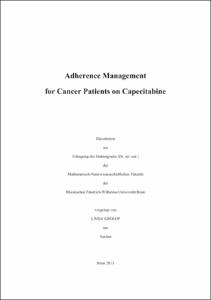Adherence Management for Cancer Patients on Capecitabine

Adherence Management for Cancer Patients on Capecitabine

| dc.contributor.advisor | Jaehde, Ulrich | |
| dc.contributor.author | Krolop, Linda | |
| dc.date.accessioned | 2020-04-19T03:04:11Z | |
| dc.date.available | 2020-04-19T03:04:11Z | |
| dc.date.issued | 13.01.2014 | |
| dc.identifier.uri | https://hdl.handle.net/20.500.11811/5818 | |
| dc.description.abstract | The oral anticancer drug capecitabine is given twice daily for 14 days followed by a seven day rest period. Adequate patient adherence is essential for treatment success. The present study aimed at developing and evaluating a multiprofessional modular medication management to assure adherence to capecitabine. The study was conducted as a prospective, multicentred observational cohort study. All participants received pharmaceutical care consisting of oral and written information. Daily adherence was defined as percentage of days with correctly administered doses and assessed using medication event monitoring. According to their daily adherence during the first cycle, patients were identified as initially non-adherent (<90% adherence) or adherent (≥90% adherence). Initially non-adherent patients received additional adherence support. Secondary endpoints included quality of life, patient satisfaction with information, occurrence of hand-foot syndrome (HFS), pharmacist’s working time, and patients’ evaluation of capecitabine treatment. Seventy-three patients with various tumour entities were enrolled, 58 were initially adherent and 15 non-adherent. Median daily adherence of initially non-adherent patients increased from 85.7% to 97.6% during the observation period of six cycles. Throughout all cycles, median daily adherence of initially adherent patients was 100.0%. Daily adherence was not associated with sociodemographic and disease-related factors. No patient was non-persistent. Quality of life was stable and patient satisfaction was high and increased over the cycles. Median HFS severity grade did not exceed a well tolerable level. Pharmacist’s working time for provision of medication management was kept within reasonable limits. Patient evaluation of treatment by initially adherent patients was good, whereas initially non-adherent patients expressed a worse impression. An early adherence screening effectively distinguishes between patients adhering and non-adhering to capecitabine. The provision of specific adherence support is associated with enhanced adherence of initially non-adherent patients, whereas initially adherent patients remain adherent for at least six cycles without specific support. Our needs-based approach helps to use available resources for adherence management efficiently. The present results show a beneficial impact of pharmaceutical care on further patient-related endpoints. | en |
| dc.language.iso | eng | |
| dc.relation.ispartofseries | Klinische Pharmazie | |
| dc.rights | In Copyright | |
| dc.rights.uri | http://rightsstatements.org/vocab/InC/1.0/ | |
| dc.subject | adherence | |
| dc.subject | compliance | |
| dc.subject | capecitabine | |
| dc.subject | pharmaceutical care | |
| dc.subject | oral chemotherapy | |
| dc.subject.ddc | 500 Naturwissenschaften | |
| dc.title | Adherence Management for Cancer Patients on Capecitabine | |
| dc.type | Dissertation oder Habilitation | |
| dc.publisher.name | Universitäts- und Landesbibliothek Bonn | |
| dc.publisher.location | Bonn | |
| dc.rights.accessRights | openAccess | |
| dc.identifier.urn | https://nbn-resolving.org/urn:nbn:de:hbz:5n-34718 | |
| dc.relation.isbn | 978-3-8439-1274-7 | |
| ulbbn.pubtype | Zweitveröffentlichung | |
| ulbbnediss.affiliation.name | Rheinische Friedrich-Wilhelms-Universität Bonn | |
| ulbbnediss.affiliation.location | Bonn | |
| ulbbnediss.thesis.level | Dissertation | |
| ulbbnediss.dissID | 3471 | |
| ulbbnediss.date.accepted | 30.08.2013 | |
| ulbbnediss.fakultaet | Mathematisch-Naturwissenschaftliche Fakultät | |
| dc.contributor.coReferee | Ko, Yon-Dschun |
Files in this item
This item appears in the following Collection(s)
-
E-Dissertationen (4496)




